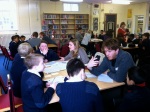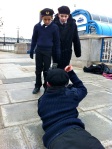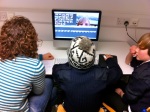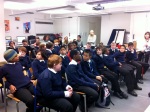 English student teachers and some Year 7s jointly embraced the challenge of making a ‘Film in a Day’. An ever-fruitful collaboration between The Institute of Education (IoE) and London Nautical School (LNS) produced some truly imaginative, filmed responses to ‘The Rime of the Ancient Mariner’. Theo Bryer and Rebecca Wilson from the IoE and LNS English teachers Chris Waugh & Morlette Lindsay (also IoE), worked in partnership to create an intertextual learning extravaganza.
English student teachers and some Year 7s jointly embraced the challenge of making a ‘Film in a Day’. An ever-fruitful collaboration between The Institute of Education (IoE) and London Nautical School (LNS) produced some truly imaginative, filmed responses to ‘The Rime of the Ancient Mariner’. Theo Bryer and Rebecca Wilson from the IoE and LNS English teachers Chris Waugh & Morlette Lindsay (also IoE), worked in partnership to create an intertextual learning extravaganza.
The Year 7s were well prepared for the day in terms of familiarity with the poem and with thoughts on a filmed and edited response. The teachers had been trained in the use of software and Flip cameras the day before, having made their own ‘film in a day’, and were thus primed to execute new knowledge. Many pages and posts could be written on why this project was the success it was, but in my role as observer, capturer and enthusiast, I’d like to highlight a couple of points…
Cary Bazalgette, indefatigable advocate of moving image literacy (MIE), has long been voicing the benefits of its more widespread use in school curricula. In her 2009 report “Impacts of Moving Image Education: A Summary of Research for Scottish Screen“, she concludes from various studies that:
… by gaining confidence and control in one medium, it becomes easier for children to envisage themselves as authors in other media too: thus, gains in the more conventional ‘textual production’ modes of writing, speaking and listening are reported across most of the studies (2009:21)
Not only does use of one medium nourish the use of others, Chris claims that the nuanced meaning-making and sophisticated understanding evidenced by the boys’ films in some cases far exceeds that which could have been achieved with a written response.
From the teachers’ perspective, although a 3:1 pupil/teacher ratio isn’t realistic in the real world, experience shows that with adequate logistical and pupil preparation in media-related projects, teachers could aspire to a facilitator’s role, choreographing groups rather than directing them. In this way, students feel the benefit of autonomous and sticky learning.
As Chris pointed out on a subsequent screening day to all 130 student teachers and as Theo materially demonstrated throughout the 2-day stint, it takes a pioneering spirit to promote film making as an alternative means of showing understanding in traditional school settings.Both students and teachers were very much ‘in the moment’ during editing (see my posts on flow), making deeper and remixed reference back to the text. What more can an English teacher ask?
Increasingly I think that digital editing not only provides a meaningful context for learning but also makes explicit a key 21st century competence: being discerning when it comes to making selections from masses of data. The boys’ films can be seen on Chris’s Year 7 blog.
Here’s a short film of various moments in the day, showing salubrious levels of interaction between students and teachers.













Thanks so much to Michelle for documenting this event.
There is much to learn and understand from this project about the ways that the boys (and their student teachers helpers) interpreted the poem through the medium of film – generating their own readings of The Ancient Mariner with an impressive degree of commitment, imagination and passion.
One of the student teachers involved wrote about the decisions that the group of boys she worked with made, through the processes of filming and editing. I was struck, in reading her account, by how the boys had been inspired to share their interpretation of the poem through moving image, sound and effect – in more specific and informed ways than I had realised.
Another student teacher commented on how she found the processes of filming and editing very different – and how they complemented each other. She suggested that editing was like completing a thought in words (drawing on Vygotsky I think). This also reminded me of Burn and Durran’s suggestion (2007: 5) that filming is a ‘fluid’ and ‘improvisatory’ process while digital editing can feel like ‘making a filmic ‘sentence”. I find it fascinating that through these different creative processes Chris’s year 7 boys were able to speak back to the text in ways that seem both poetic and filmic. They were almost defining a new genre – a genre that makes sense to the immediate audience of their class, through the process.
So to go back to Michael Rosen’s comment – above, I think in this case, the boys were able to claim ownership of a poem from the literary canon through a process that is about literacy (media and digital literacy as well as reading and writing) but that draws on different creative and cultural traditions and ways of working. I think it’s a good mix – but not everyone would agree. It does matter who lays claim to literacy – who defines it. We have to work hard to argue for different definitions.
It would be interesting to ask the students what it was about!
Posted by Theo Bryer | March 8, 2012, 1:41 pmThanks Theo for your insightful comment. I don’t think there’s any doubt about where I stand on the ‘who owns literacy’ debate and of course wholeheartedly endorse “the good mix” to which you refer at the end. The project highlighted the social potential lacking in traditional approaches to literacy. I have a persistent image in my head of lonesome pre-Gutenberg medieval scribes painstakingly copying out religious texts and then, rather cynically, trying to figure out the difference/similarities between that and rows of students hunched over desks in exam halls churning out pre-digested exam-ese.
Posted by Michelle Cannon | March 10, 2012, 2:38 pmIt is so much easier to assess that individual process of meaning making which may partly explain why it has defined the school experience for so long! But the outcomes are usually far more exciting and interesting when they are arrived at through a collaborative process.
Posted by Theo Bryer | March 11, 2012, 6:44 pmI agree Theo… which begs the question, why should our students be hostages to a potentially deficit model of curriculum content and delivery as a result of some intractable deficit model of assessment? Perhaps it’s time to think about a) an option to submit media texts with reflective voice-over commentary and/or b) some modification of the ‘MFL oral’ model – a recorded conversation with a checklist of competencies. Competencies which may draw more on imaginative/social benchmarking (see post on LCI’s ‘Ten Capacities for Imaginative Learning’).
Posted by Michelle Cannon | March 15, 2012, 1:19 pm